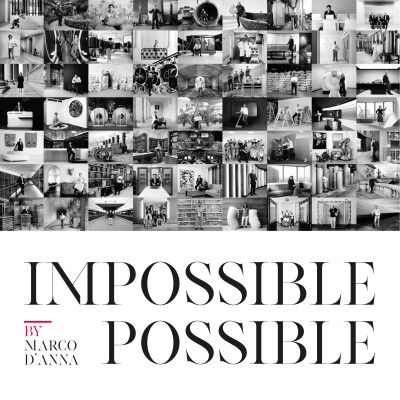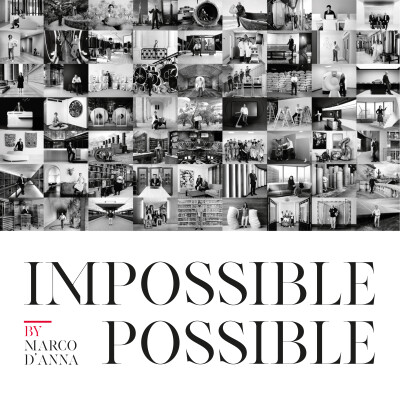Serge TriganoMy father had a wife, who is my designated mom, and a mistress who was the Club. The Club started in the 50's as a little adventure of friends at the end of the war, who wanted to offer a little happiness to people and it was transformed by my dad into a kind of empire that developed all over the world. I was lucky to live in that atmosphere, where my father would tell us his stories when he was back home: of having convinced the King of Morocco to build a village in Agadir, to have convinced the president of the bulgarian communist party that it was necessary for him to open up to tourism. I was immersed in that world. And the Club had this wonderful aspect, which was that it brought together men and women from all over the world. It was an adventure in which Jews, Muslims, whites, blacks, all mixed joyfully throughout the seasons, more or less crazy, more or less wonderful, with amazing boys and girls. I was fortunate to experience this somewhat exceptional youth, alongside a rather unique man, my dad, and especially with truly remarkable men and women who were the G.O of Club Med at the time. We slept Club, we lived Club, we ate Club. I grew up in this environment, I learned everything I learned. I learned to speak in public, I learned to read numbers, I learned a whole series of things in this adventure. I was lucky to spend five years in the United States in the 80's, which were the Reagan years, the years of Studio 54, a mix of puritanism and completely wild madness, and to launch the Club in the American market by doubling our size in that market. And then I was appointed President in 1993, in a somewhat complicated context, with administrators explaining to me that I had six months to prove my value, which is always a bit of pressure. But well, I tried to do my best. At that time, there was a shareholder who was gaining influence in the Club's ownership. And then one day, following a performance that was not as good as what financial analysts expected, due to communication errors, they informed me that they wished to part ways with me. And so 3-it was very difficult, of course. At the same time, it was a tremendous lesson in humility. 1-When you are the President of a company like the Club, you are adored, regarded as someone exceptional, you are welcomed in all countries by heads of state, you do not know what it is like to deal with the police, customs, or immigration, they come to get you at the bottom of the plane. So, 2-we lived in a kind of bubble. Therefore, when the bubble bursts, it brings you back to reality and that's not bad. Being kicked out of the Club might be a good thing for me. Because if I had succeeded, in any case, it was Gilbert's success, my dad’s success. I was 50 years old, with neither the desire nor the means to stop. We were not the owners of the Club, contrary to what some thought. 4-And then, once again, I was lucky to have a strong wife who didn't let me down, two wonderful sons who told me: "We're going to do something with you again". And from there, we decided that there might be things to do in the hotel industry and we thought about the adventure of Mama Shelter. When you are told that it will never work but you believe in the project, you keep going there. And by the way, today I am worried when someone tells me that it is a very good idea. I would rather be told that it will never work, because that is actually a good sign since I am superstitious and that is what I have been told for years and months. As for the opening of Mama, we believed in it, once again, we put everything into it, all our energy, all our savings, we believed in this project. It could have been a disaster, it was set up to be a disaster that would have ruined us for two or three generations. But I think that when you carry a project in your heart, in your guts, you finally go for it. Until the arrival of Mama Shelter, a hotel was a place where you come, drop your bags, take a shower, and then go out to eat. We took the opposite approach, which actually made the start a bit more complicated, by saying that you can also make a hotel a place where people could come to spend a weekend, have a drink at the bar, and eat. We are fortunate to have Philippe Starck who agrees to take part of the journey with us, Alain Senderens, who was one of the brightest Michelin-starred chefs in France, who agrees to work with us in this 20th arrondissement of Paris. Mama opened up and then it was an almost instant success because it matched people's tastes. What is me in some way, is perhaps the quirky side of Mama, the fact that we mixed the talents of a Starck, a Cyril, my sons, Alain Senderens, and created something a bit crazy. It took some guts to dare to set up on Bagnolet Street, in the 20th district, far from the subway stations. The few experts who had studied the situation explained to me in detail that it would never work and that at best, we would serve 40 place settings on Fridays and Saturdays and that it would be better to stay closed during the week. And when we opened, after a few weeks, we served 600 to 700 place settings per day, from Monday to Sunday. Because it is a place that I believe meets the true expectations of people. Simple places where we meet, even when we are alone and there are many single women who come to Mama. When we travel and are alone, we often feel uncomfortable when we go to a restaurant, we feel a bit awkward about all the tables where there are people. Here, we feel good because we can sit at the bar, chat with the bartender, exchange a little, and the staff is hired based on their attitudes more than their skills. We try to find men and women who reach out to others. It's a mix of diversity, there are all colors of the world. And the clientele of Mama is a mix of people who take the subway at Gambetta or Père Lachaise. Then there are those who arrive by car, with a driver, because it's the place to be at that moment. And that's a little bit what I found amusing when we created Mama. Then Mama expanded, it established itself in all the major cities of France. We opened Mama in Dubai at the end of the year. And now Mama is part of the Accor galaxy and we are working on other projects. The great hotel successes are family successes. It's the Oberoi in India, it's the Pritzkers with Hyatt, it's the Marriotts. It's often family stories. Because working in the hotel industry means accepting for your partner that there will be no set hours, no weekends, no evenings, that things can happen twenty-four hours a day. So, if the man or woman who accompanies you, the children who accompany you, do not share this adventure, it cannot work. So that's the first point. And the second point is trust. Working with family, at least for me, means knowing that I can trust my sons and that it's mutual and that I will not be betrayed by them, that they will not betray me and that I will not betray them. It's a pleasure to work with my sons, but at the same time, it's a constant debate. We never agree on anything. We discussed for hours about whether we should put televisions in the rooms of Mama Shelter back then. Now, we discuss for hours about how we are going to design the restaurant. But I think it's rather enjoyable, it's quite nice. I have one son who lives in Los Angeles, and another who lives in Paris. The one who lives in Paris, who is the head of the company, is very focused on results and numbers. And the one in Los Angeles is more of a poet who dreams of things. So that sometimes creates friction and email exchanges all night long. And I, at 5 or 6 in the morning, try to find a synthesis that makes more a less a consensus to continue the story together. The notion of trust is something that is crucial, fundamental. Trusting your shareholders, trusting your teams. I cannot live without that. I cannot live in doubt. I cannot live in hypocrisy. Then, there is transparency, we have to be accountable, and so on. But yes, working in trust is something that, for me, is essential. And I don't know how to do it any other way. I am fortunate to work in a profession that is exciting. So I don't want to stop. I want to continue to take on challenges. I think that if I were to retire and stay at home, my wife would kick me out or we would get divorced. So since I want to keep her, I keep working. And there you go, it allows me to travel, to continue meeting people. Oh Baby, for me, is a new adventure that consists of trying to get back to the basics of the hotel industry, but keeping the Trigano touch that has contributed to our success with the Club, Mama, and hopefully tomorrow with Oh Baby with a first hotel. If all goes well, we should open in 2026 in Milan. And then we have a number of projects in France. 5-What my father taught me is this mixing, once again, of religions, of skin colors. That was the wonderful phenomenon in the history of the Club. 6-It's what we tried to maintain in the Mama adventure. It's about recruiting men, women, and diversity. And I learned that. I learned to live with others who are not the same as me, who are different from me, whom I learn to understand, to appreciate, to accept that some may not agree with me. That's it, I've learned all this over time.




